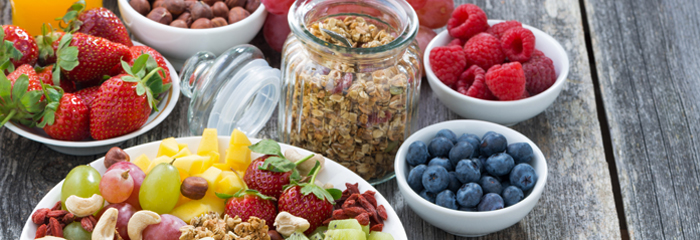10 Strategies for Healthy Snacking

Snacking is controversial. Some people say it’s good to snack as it keeps blood sugar levels stable and prevents excessive hunger which can lead to over eating. Others say it’s best to leave a good few hours between meals to allow digestion to take place fully. We are all different and will have different needs when it comes to frequency of food intake. One thing is for certain though, it is likely that we will all need to snack sometimes and the main problem is that snack foods can be a major downfall in an otherwise healthy diet and lifestyle. Here are some tips for healthy snacking for when, inevitably, the need arises:
1. Be prepared
Plan your snacks and take them with you. Relying on buying snacks while out and about is a dangerous strategy as most readily available snack foods are high in calories and low in nutrients.
2. Avoid sugary and processed snacks
These will not keep you satisfied for long and will lead to cravings for more sugar.
3. Include protein and fibre
Protein and fibre both slow down the release of sugars from carbohydrates and will keep you feeling full for longer. Good examples include hummous with carrot sticks or apple slices with nut butter.
4. Sit down, eat mindfully and chew thoroughly
Rather than snacking on the hoof sit down and enjoy your snack. Eat consciously savouring every bite and chew each mouthful well. You will absorb more nutrients and allow time for the body to register that you’ve had enough. Eating while distracted can cause you to eat more than is needed.
5. Drink something first
Thirst is often mistaken for hunger so have a drink before going for solid food. If you still feel the need to snack, go ahead!
6. Choose nutrient rich foods
Nutrient rich foods tend to be lower in calories and more filling.
7. Exercise portion control
If you sit down with a whole bag of nuts the chances are you will eat the whole bag before registering how full you are. Instead take a portion of your snack and put the rest away.
8. Avoid artificial sweeteners
These are found in many diet foods and drinks. Whilst you may think there is no harm in ingesting food and drinks that contain few, if any, calories, there are now many studies to show that artificial sweeteners contribute to weight gain. For more information see http://www.foodforthoughtuk.com/artificial-sweeteners.
9. Beware of unhealthy snack opportunities
Avoid areas at work where junk food lurks, don’t keep unhealthy snacks in the house, don’t shop while hungry and beware of emotional or lifestyle triggers.
10. Beware of boredom
Boredom often leads to snacking. Find other activities to turn to should boredom strike. Going for a walk, reading, gardening, cleaning, talking to a friend may all provide sufficient distraction and the urge to snack will pass.